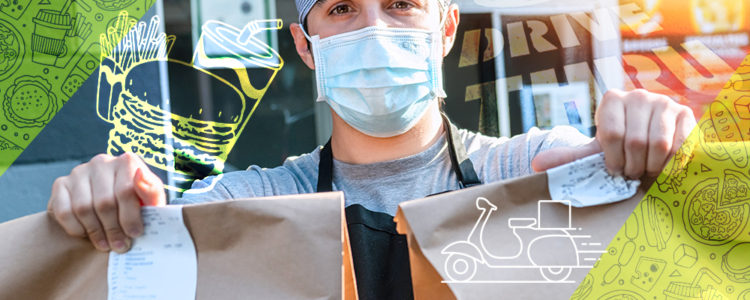COVID-19 pandemic on the food and beverage industry
The COVID-19 pandemic has had a significant impact on various industries globally, and the food and beverage industry is no exception. The outbreak of the pandemic has caused many challenges for the industry, leading to significant changes in the way food and beverages are produced, distributed, and consumed. In this article, we will examine the impact of the COVID-19 pandemic on the food and beverage industry and the measures taken by the industry to cope with the challenges posed by the pandemic.
Production and Distribution Challenges
The COVID-19 pandemic has caused many production and distribution challenges in the food and beverage industry. Lockdowns, social distancing measures, and travel restrictions imposed by governments to curb the spread of the virus have resulted in a shortage of labour in the food and beverage industry. This shortage of labour has affected the production and distribution of food and beverages, leading to delays in supply chains.

The pandemic has also led to changes in consumer behaviour, such as the increased demand for online ordering and home delivery of food and beverages. This shift in consumer behaviour has put significant pressure on the distribution systems of the food and beverage industry, which were not initially designed to handle such high volumes of online orders.
Food Safety Concerns
Food safety has become a significant concern during the COVID-19 pandemic, with consumers worried about the risk of infection from food and beverage products. To address these concerns, the food and beverage industry has had to implement strict hygiene and sanitation measures in their facilities, including regular cleaning and disinfection of surfaces, temperature checks for staff, and mandatory use of personal protective equipment (PPE).
The pandemic has also highlighted the need for greater transparency in the food supply chain, with consumers demanding more information about the origin and safety of their food and beverages. The industry has responded by providing more information about the sourcing and handling of their products, with some companies adopting blockchain technology to track their products from farm to table.
Shift to Digital Platforms
The COVID-19 pandemic has accelerated the shift towards digital platforms in the food and beverage industry, with many businesses adopting online ordering, contactless payments, and delivery services. This shift has been driven by the need to maintain social distancing and reduce the risk of infection among customers and staff.
The use of digital platforms has also allowed businesses to reach a wider audience, with many restaurants and cafes offering virtual dining experiences and online cooking classes. This shift towards digital platforms has presented new opportunities for businesses to engage with their customers and generate revenue during the pandemic.
Impact on Food and Beverage Consumption
The COVID-19 pandemic has had a significant impact on food and beverage consumption, with changes in consumer behaviour leading to shifts in demand for certain products. The closure of restaurants and cafes has led to a decline in sales of food and beverages in these establishments, while the demand for packaged and processed foods has increased due to the convenience and longer shelf life of these products.

The pandemic has also led to changes in the types of food and beverages that consumers are consuming, with a greater focus on health and wellness. This trend towards healthier options has led to an increase in demand for plant-based products, functional foods, and beverages that are high in vitamins and nutrients.
Measures Taken by the Industry
The food and beverage industry has taken several measures to cope with the challenges posed by the COVID-19 pandemic. These measures include:
- Implementation of hygiene and sanitation measures in production facilities to ensure food safety.
- Adoption of digital platforms for online ordering, contactless payments, and delivery services.
- Greater transparency in the food supply chain to provide consumers with more information about the safety and origin of their food and beverages.
- Collaboration between businesses to share resources and reduce the impact of the pandemic on the industry.
- Innovation in product development to meet the changing demands of consumers, including the development of plant-based products and functional foods that promote health and wellness.
- Reducing food waste by donating surplus food to food banks and charities, and implementing measures to minimize food spoilage during transportation and storage.
- Providing support to employees, such as paid sick leave and mental health resources, to ensure their well-being during the pandemic.
Furthermore, the pandemic has emphasized the need for greater collaboration and communication among stakeholders in the food and beverage industry. This includes government agencies, farmers, manufacturers, distributors, and retailers, all of whom play a vital role in ensuring food security and maintaining the supply chain during times of crisis.
One way to promote greater collaboration and communication is through the adoption of technology, such as blockchain, which can facilitate transparency and traceability in the food supply chain. By providing a secure and decentralized ledger of transactions, blockchain can enable stakeholders to track the origin and movement of food and beverages, reducing the risk of fraud and ensuring the safety and quality of products.
Conclusion
The COVID-19 pandemic has had a significant impact on the food and beverage industry, causing production and distribution challenges, food safety concerns, and changes in consumer behaviour. However, the industry has responded to these challenges by implementing hygiene and sanitation measures, adopting digital platforms, increasing transparency in the food supply chain, collaborating with other businesses, and innovating product development.
The pandemic has also highlighted the importance of food security and the need for more sustainable and resilient food systems. As the world continues to navigate the ongoing pandemic, it is essential for the food and beverage industry to adapt and evolve to meet the changing needs of consumers and ensure the safety and sustainability of the global food supply chain.



